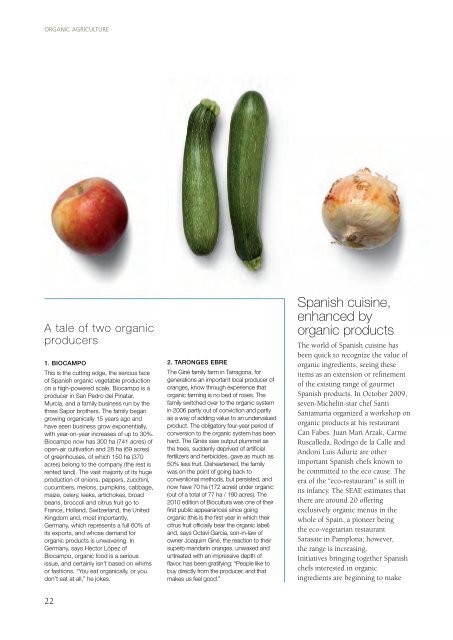Flan de la casa con natas en texturas - Foods From Spain
Flan de la casa con natas en texturas - Foods From Spain
Flan de la casa con natas en texturas - Foods From Spain
You also want an ePaper? Increase the reach of your titles
YUMPU automatically turns print PDFs into web optimized ePapers that Google loves.
ORGANIC AGRICULTURE<br />
A tale of two organic<br />
producers<br />
1. BIOCAMPO<br />
This is the cutting edge, the serious face<br />
of Spanish organic vegetable production<br />
on a high-powered scale. Biocampo is a<br />
producer in San Pedro <strong>de</strong>l Pinatar,<br />
Murcia, and a family business run by the<br />
three Sapor brothers. The family began<br />
growing organically 15 years ago and<br />
have se<strong>en</strong> business grow expon<strong>en</strong>tially,<br />
with year-on-year increases of up to 30%.<br />
Biocampo now has 300 ha (741 acres) of<br />
op<strong>en</strong>-air cultivation and 28 ha (69 acres)<br />
of gre<strong>en</strong>houses, of which 150 ha (370<br />
acres) belong to the company (the rest is<br />
r<strong>en</strong>ted <strong>la</strong>nd). The vast majority of its huge<br />
production of onions, peppers, zucchini,<br />
cucumbers, melons, pumpkins, cabbage,<br />
maize, celery, leeks, artichokes, broad<br />
beans, broccoli and citrus fruit go to<br />
France, Hol<strong>la</strong>nd, Switzer<strong>la</strong>nd, the United<br />
Kingdom and, most importantly,<br />
Germany, which repres<strong>en</strong>ts a full 60% of<br />
its exports, and whose <strong>de</strong>mand for<br />
organic products is unwavering. In<br />
Germany, says Héctor López of<br />
Biocampo, organic food is a serious<br />
issue, and certainly isn’t based on whims<br />
or fashions. “You eat organically, or you<br />
don’t eat at all,” he jokes.<br />
22<br />
2. TARONGES EBRE<br />
The Giné family farm in Tarragona, for<br />
g<strong>en</strong>erations an important local producer of<br />
oranges, know through experi<strong>en</strong>ce that<br />
organic farming is no bed of roses. The<br />
family switched over to the organic system<br />
in 2006 partly out of <strong>con</strong>viction and partly<br />
as a way of adding value to an un<strong>de</strong>rvalued<br />
product. The obligatory four-year period of<br />
<strong>con</strong>version to the organic system has be<strong>en</strong><br />
hard. The Ginés saw output plummet as<br />
the trees, sud<strong>de</strong>nly <strong>de</strong>prived of artificial<br />
fertilizers and herbici<strong>de</strong>s, gave as much as<br />
50% less fruit. Disheart<strong>en</strong>ed, the family<br />
was on the point of going back to<br />
<strong>con</strong>v<strong>en</strong>tional methods, but persisted, and<br />
now have 70 ha (172 acres) un<strong>de</strong>r organic<br />
(out of a total of 77 ha / 190 acres). The<br />
2010 edition of Biocultura was one of their<br />
first public appearances since going<br />
organic (this is the first year in which their<br />
citrus fruit officially bear the organic <strong>la</strong>bel)<br />
and, says Octavi Garcia, son-in-<strong>la</strong>w of<br />
owner Joaquim Giné, the reaction to their<br />
superb mandarin oranges, unwaxed and<br />
untreated with an impressive <strong>de</strong>pth of<br />
f<strong>la</strong>vor, has be<strong>en</strong> gratifying: “People like to<br />
buy directly from the producer, and that<br />
makes us feel good.”<br />
Spanish cuisine,<br />
<strong>en</strong>hanced by<br />
organic products<br />
The world of Spanish cuisine has<br />
be<strong>en</strong> quick to recognize the value of<br />
organic ingredi<strong>en</strong>ts, seeing these<br />
items as an ext<strong>en</strong>sion or refinem<strong>en</strong>t<br />
of the existing range of gourmet<br />
Spanish products. In October 2009,<br />
sev<strong>en</strong>-Michelin-star chef Santi<br />
Santamaria organized a workshop on<br />
organic products at his restaurant<br />
Can Fabes. Juan Mari Arzak, Carme<br />
Ruscalleda, Rodrigo <strong>de</strong> <strong>la</strong> Calle and<br />
Andoni Luis Aduriz are other<br />
important Spanish chefs known to<br />
be committed to the eco cause. The<br />
era of the “eco-restaurant” is still in<br />
its infancy. The SEAE estimates that<br />
there are around 20 offering<br />
exclusively organic m<strong>en</strong>us in the<br />
whole of <strong>Spain</strong>, a pioneer being<br />
the eco-vegetarian restaurant<br />
Sarasate in Pamplona; however,<br />
the range is increasing.<br />
Initiatives bringing together Spanish<br />
chefs interested in organic<br />
ingredi<strong>en</strong>ts are beginning to make


